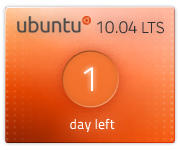The Ubuntu team is pleased to announce Ubuntu 10.04 LTS (Long-Term Support). This release incorporates the Desktop Edition and the Server Edition. The Server Edition can be used on physical servers, on Ubuntu Enterprise Cloud (UEC), and on Amazon’s EC2 public cloud. Codenamed "Lucid Lynx", 10.04 LTS continues Ubuntu’s proud tradition of integrating the latest and greatest open source technologies into a high-quality, easy-to-use Linux distribution.
We are also pleased to announce Ubuntu 10.04 Netbook Edition, which is not a long-term support release.
Read more about the features of Ubuntu 10.04 LTS in the following press releases:
Desktop and Netbook editions
http://www.ubuntu.com/news/ubuntu-10.04-desktop-edition
Server edition http://www.ubuntu.com/news/ubuntu-10.04-server-edition
Ubuntu 10.04 LTS will be supported for three years on desktops and five years on servers. Ubuntu 10.04 Netbook Edition will be supported for 18 months.
Thanks to the efforts of the global translation community, Ubuntu is available in 29 languages. For a list of supported languages and detailed translation statistics for these and other languages, see:
http://people.ubuntu.com/~dpm/ubuntu-10.04-translation-stats.html
Ubuntu 10.04 LTS is also the basis for new 10.04 releases of Kubuntu, Xubuntu, Edubuntu, UbuntuStudio, and Mythbuntu:
Kubuntu http://kubuntu.org/news/10.04-lts-release
Xubuntu http://xubuntu.org/news/10.04-release
Edubuntu http://edubuntu.org/news/10.04-release
Mythbuntu http://mythbuntu.org/10.04/release
Ubuntu Studio https://wiki.ubuntu.com/UbuntuStudio/10.04release_notes
To Get Ubuntu 10.04 LTS
———————————-
To download Ubuntu 10.04, or obtain CDs, visit:
http://www.ubuntu.com/getubuntu
Users of Ubuntu 9.10 will be offered an automatic upgrade to 10.04 LTS via Update Manager. For further information about upgrading, see:
http://www.ubuntu.com/getubuntu/upgrading
Users of Ubuntu 8.04 LTS may wish to wait for 10.04.1 LTS, due in July 2010, before upgrading.
As always, upgrades to the latest version of Ubuntu are entirely free of charge.
We recommend that all users read the release notes, which document caveats and workarounds for known issues. They are available at:
http://www.ubuntu.com/getubuntu/releasenotes/1004
Find out what’s new in this release with a graphical overview:
http://www.ubuntu.com/getubuntu/releasenotes/1004overview
If you have a question, or if you think you may have found a bug but aren’t sure, try asking on the #ubuntu IRC channel, on the Ubuntu Users mailing list, or on the Ubuntu forums:
#ubuntu on irc.freenode.net
http://lists.ubuntu.com/mailman/listinfo/ubuntu-users
http://www.ubuntuforums.org/
Ubuntu Netbook Edition on ARM
——————————————-
The ARM optimised variant of Ubuntu Netbook Edition comes with a lightweight application selection tailored specifically for ARM deployments, including a web-based office and mail solution and a launcher that works with and without graphics acceleration.
Helping Shape Ubuntu
——————————
If you would like to help shape Ubuntu, take a look at the list of ways you can participate at:
http://www.ubuntu.com/community/participate/
About Ubuntu
——————
Ubuntu is a full-featured Linux distribution for desktops, laptops, netbooks and servers, with a fast and easy installation and regular releases. A tightly-integrated selection of excellent applications is included, and an incredible variety of add-on software is just a few clicks away.
Professional services including support are available from Canonical and hundreds of other companies around the world. For more information about support, visit:
More Information
————————
You can find out more about Ubuntu and about this release on our website:
To sign up for future Ubuntu announcements, please subscribe to Ubuntu’s very low volume announcement list at:
http://lists.ubuntu.com/mailman/listinfo/ubuntu-announce
[Discuss the Ubuntu 10.04 LTS Release on the Forum]
Originally sent to the ubuntu-announce Mailing List by Steve Langasek on Thu Apr 29 18:24:24 BST 2010

